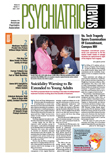I am pleased to see that in the December 15, 2006, issue, Psychiatric News drew attention to Morgellons disease and that the excellent article gave sound advice on communicating with delusional parasitosis patients. However, I would like to add comments about the distinction between Morgellons disease and delusional parasitosis.
I've evaluated and treated Morgellons patients, spoken with researchers and other clinicians who work with these patients, read the limited literature on the subject, and reviewed a database of 3,000 Morgellons patients. The Morgellons patients I have seen had surprisingly similar symptoms, with an abrupt onset, often following a toxic exposure. Before the onset of their illness, these patients' mental status appeared to be quite representative of the general population, and some (including physicians) were high-functioning professionals. The condition appears more common in nurses, teachers, and in family members in the same household, which suggests a contagious component.
After the onset of the illness, these patients report surprisingly similar symptoms. They have a combination of bizarre dermatological sy mptoms, cognit ive impairments, mood disturbances, and sometimes paranoia and suicide attempts in later stages of the illness.
Their symptoms are not compatible with schizophrenia, bipolar illness, substance abuse, or other recognized causes of delusions. When patients complain of fibers protruding from their skin, examination with a low-power digital microscope can visualize and photograph the presence or absence of these fibers. In addition, many Morgellons patients test positive for Lyme disease. The mental symptoms seen in Morgellons are similar to those of other chronic general medical illnesses with psychiatric manifestations, since the mental symptoms fluctuate in a pattern similar to that of the general medical symptoms; and this suggests that the mental symptoms are probably associated with immune and/or toxic effects upon the brain.
When these patients are treated with modest courses of antibiotics, their dermatological and psychiatric symptoms often show significant improvement. Without a thorough assessment, Morgellons patients are commonly given a diagnosis of delusional parasitosis, resulting in a delay in proper treatment. Whatever Morgellons is, it is something very different and unique and should be considered as a condition needing further study and possibly listed in the next edition of the DSM.
In summary, Morgellons disease and delusional parasitosis are two distinct clinical entities. Morgellons does not appear to be an imaginary or delusional illness and merits the research effort that we see with any other emerging and serious illness.
